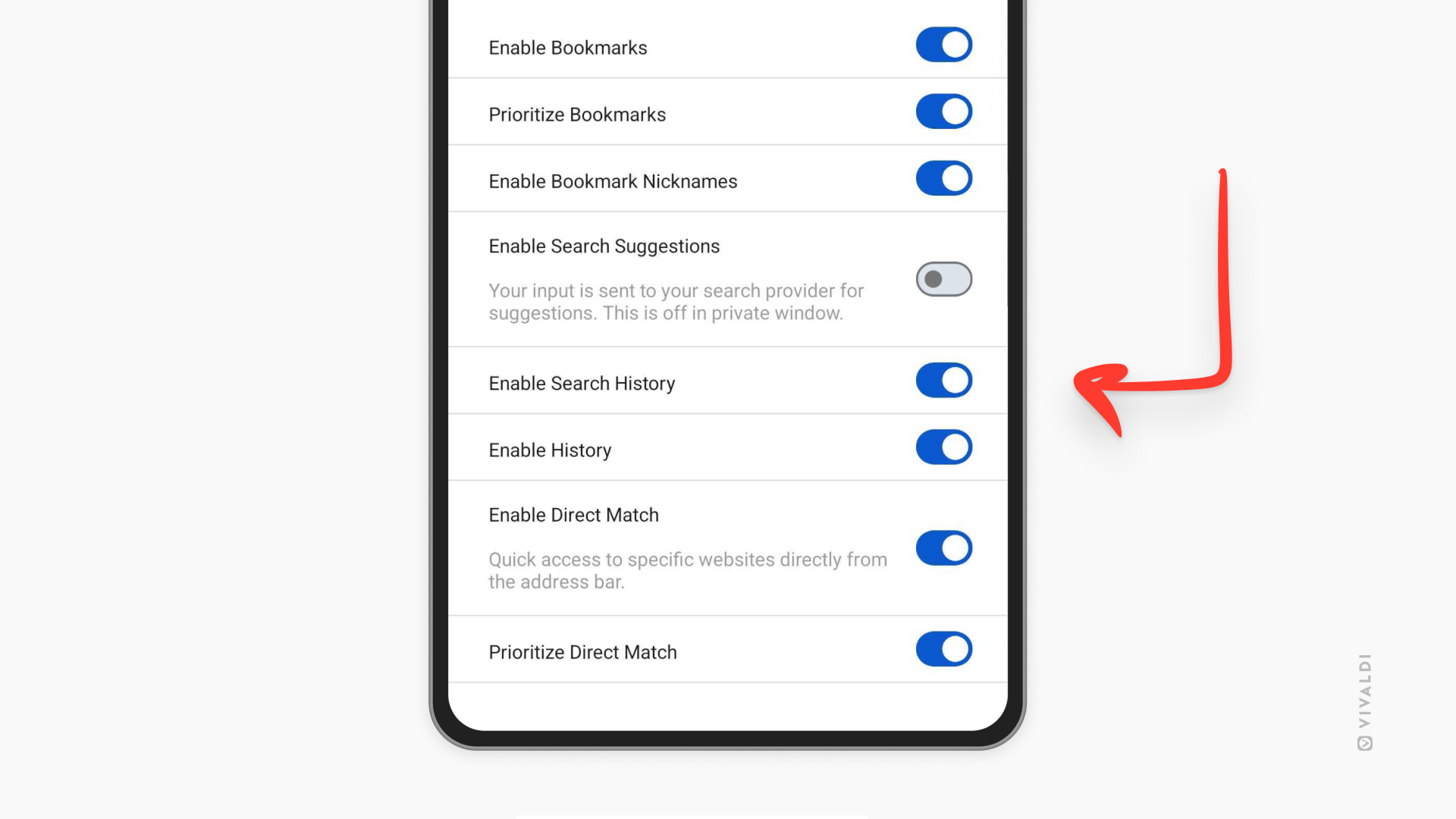Android Tips
Tip #790
February 5, 2026
Keep the most important tabs in Vivaldi on Android within easy reach by pinning them.
Tabs can accumulate fast on mobile devices. To make sure you can always access your frequently used tabs quickly, pin them in place.
To pin a tab on the Tab Bar:
- Long-press on the tab on the Tab Bar.
- Select “Pin Tab”.
To pin a Tab in the Tab Switcher:
- Open the Tab Switcher.
- Long-press on the tab’s thumbnail.
- Select “Pin Tab”.
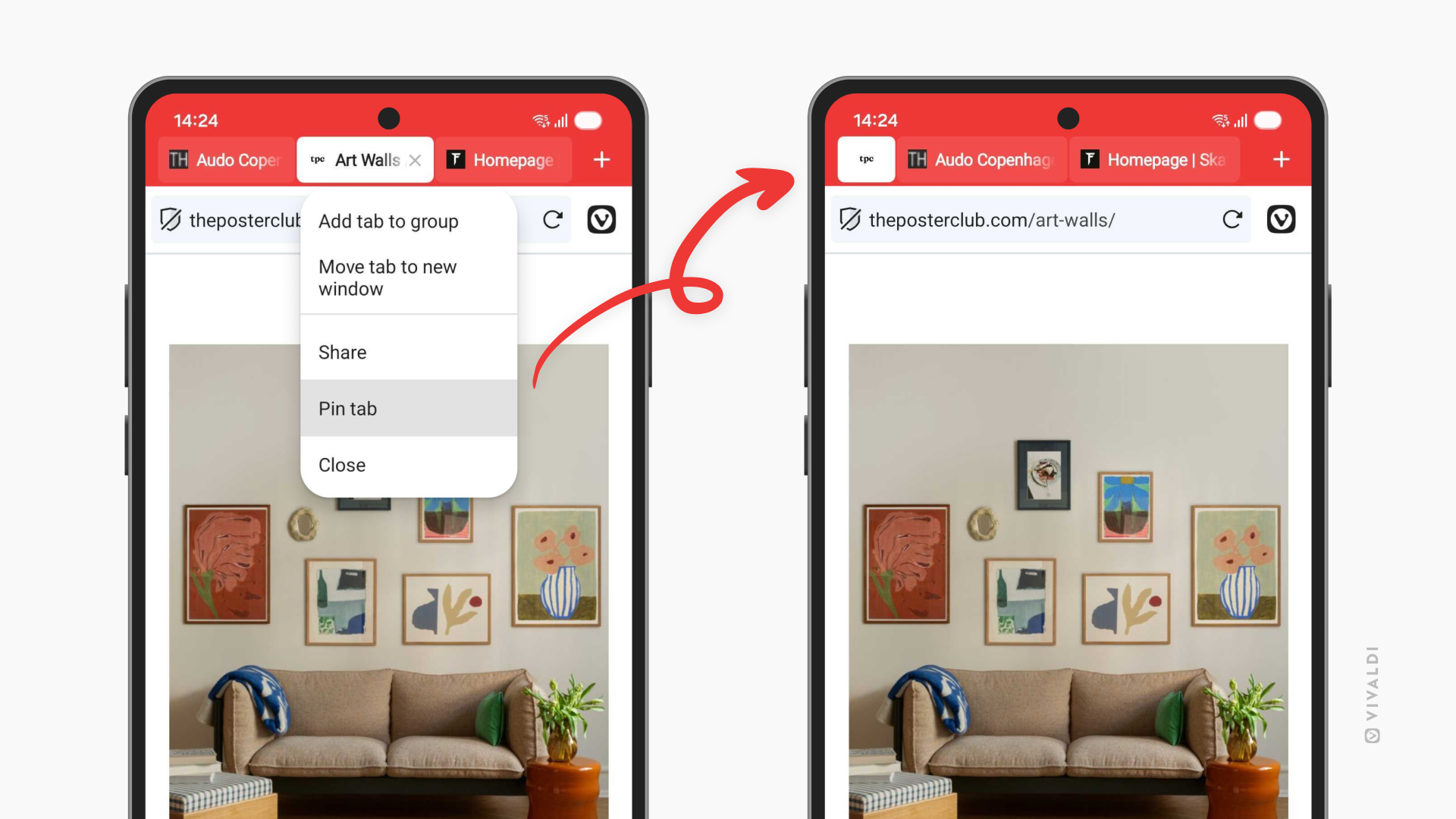
Tip #784
January 20, 2026
Set up bookmark folders in Vivaldi on Android to efficiently manage your favorite sites.
Dividing your bookmarks in Vivaldi into logically structured folders makes accessing them faster and managing them easier. There are a few ways you can create new bookmark folders in Vivaldi on Android. Find the one that works best for you.
To create a new bookmark folder on the Start Page:
- Long-press on the “Add” button on the Start Page.
- Select “Folder”.
- Give the new folder a name and select a parent folder (Location).
- Tap “Done”.
To create a new Speed Dial Group (bookmark folder on the Start Page):
- Swipe past the last group on the Start Page.
- Tap on “Add New Group”.
- Give the new folder a name.
To create a new folder by editing a bookmark:
- Find a bookmark you’d like to add to the new folder in the Bookmarks Panel or Start Page.
- Long-press on the bookmark and select “Edit” (pencil icon in the Bookmarks Panel).
- Tap on the current folder.
- Tap on “New Bookmark Folder”.
- Give the new folder a name and select a parent folder (Location).
- Tap on “Done” in the top right corner 3 times.
To create a new folder when adding a new bookmark.
- Go to the page you want to bookmark.
- Add it as a new bookmark from the main menu.
- Tap on the banner that appears at the bottom of the page.
- Tap on the current folder.
- Tap on “New Bookmark Folder”.
- Give the new folder a name and select a parent folder (Location).
- Tap on “Done” in the top right corner 3 times.

Tip #774
December 2, 2025
Open tabs from other devices in one go on mobile.
Piggybacking on the previous tip about opening a group of synced tabs on desktop, let’s look into how you can open all synced tabs in Vivaldi on Android and iOS.
To open synced tabs:
- Make sure you’re logged in to Sync with the same Vivaldi account on all devices, and that tab syncing is enabled.
- Go to the Tab Switcher > Synced Tabs.
- Long-press on the device you want to open synced tabs from.
- Select “Open all” from the context menu.
To open just one specific tab, simply tap on the tab entry on the list.
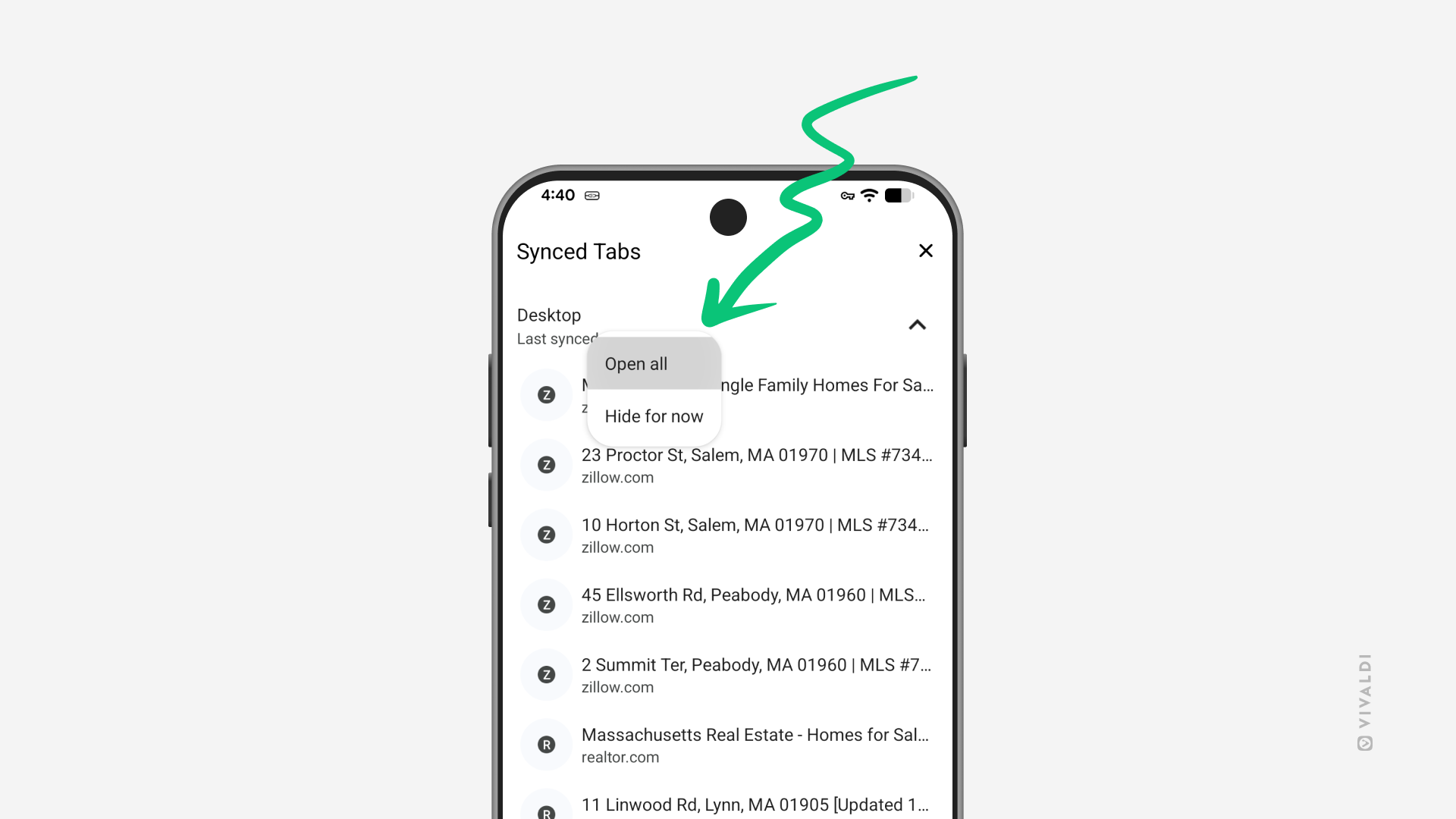
Tip #771
November 20, 2025
Import bookmarks to Vivaldi on Android from a file.
The easiest way to import bookmarks from your Vivaldi browser on another device is to use the Sync feature. But what if you want to import bookmarks from another browser? If you can export bookmarks to an HTML file from that other browser, then it’s super easy to import them to Vivaldi on Android. Here’s how!
To import bookmarks:
- Go to the Bookmarks Panel.
- Tap on the 3-dot menu in the top right corner of the panel.
- Select “Import Bookmarks”.
- In the files menu, locate and tap on the file you want to import.
You’ll find your imported bookmarks in a folder named “Imported”. If you’ve imported multiple files, the folder name will also include a number.
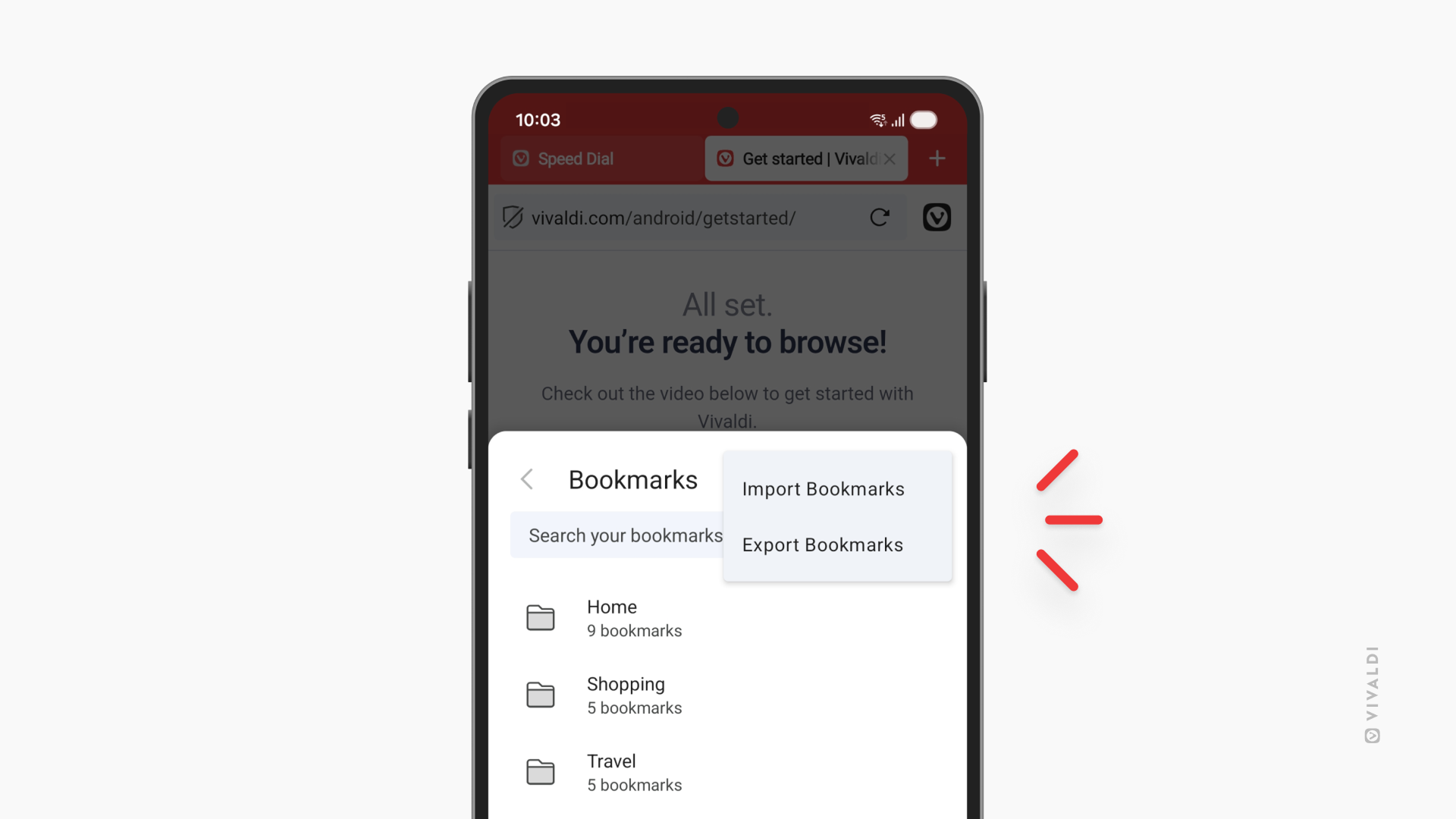
Tip #762
October 21, 2025
Open links from Vivaldi on Android’s History Panel in a new tab.
When looking up pages you’ve visited in the past in Vivaldi on Android’s History Panel, tapping on an entry will open the page in the active tab. This is fine when you have the Start Page open in the active tab, but you may be taken away from an important page as well. To avoid the latter, you should open the link in a new tab instead.
To open a link from History in a new tab:
- Open the History Panel.
- Long-press on the entry you want to open.
- Tap on the 3-dot menu icon in the top right corner.
- Select “Open in new tab” or “Open in private tab” from the menu.
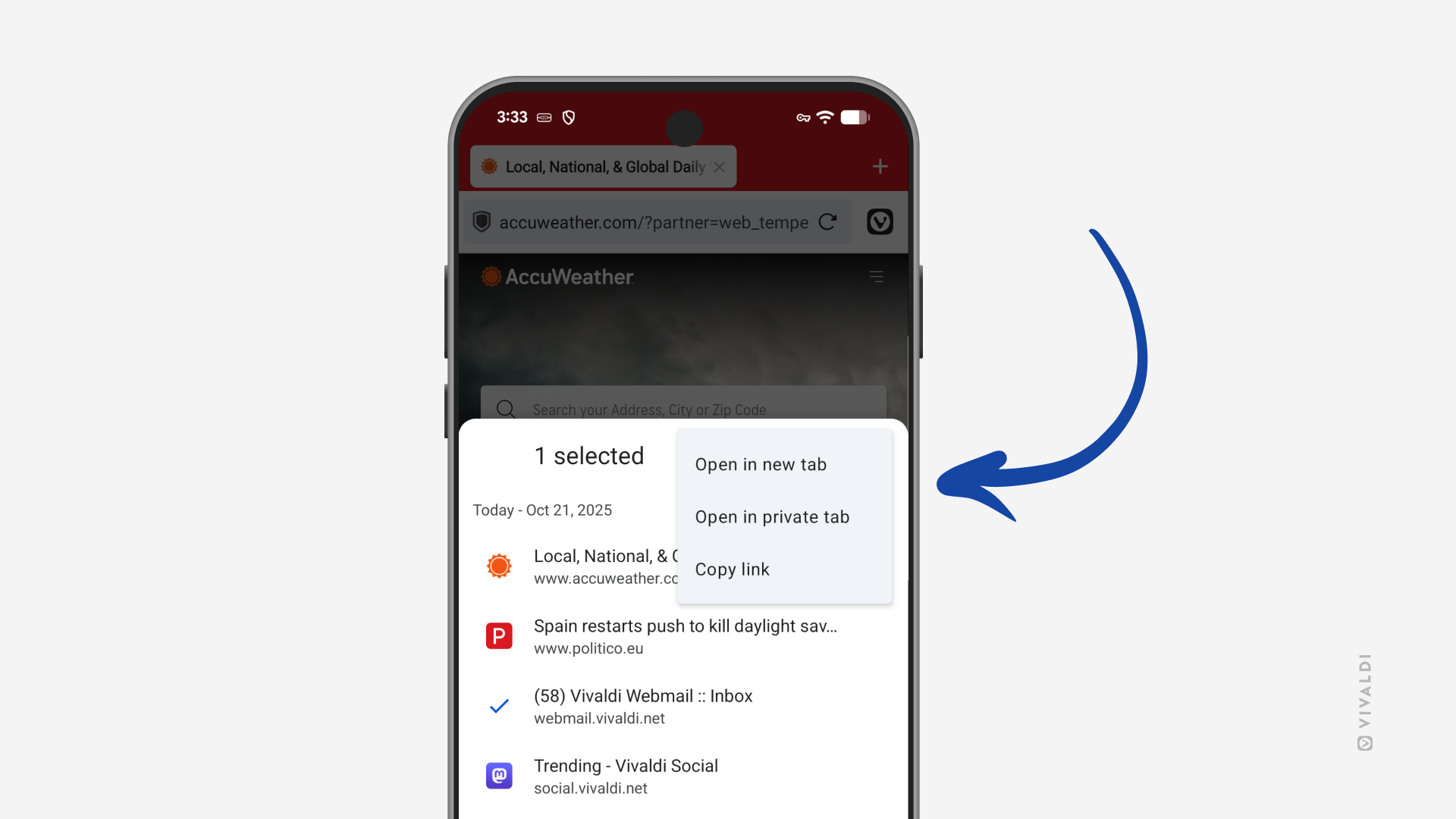
Tip #757
October 2, 2025
Share a web page from your Android tablet with a long-press on the page.
The web is full of fascinating content worth sharing. In Vivaldi on Android, there are a couple of ways you can do it. You can select “Share” from the main menu, focus on the Address Bar and select “Share” from the drop-down menu, or you can add a shortcut to the Address Bar for easy sharing. On tablets, there’s an additional option.
To share the page open in the active tab from an Android tablet:
- Long-press on an empty area on the page.
- Select “Share”.
- Copy the link or select an app to share it with.
If you long-press on an image or a link on the page, you can share those too.
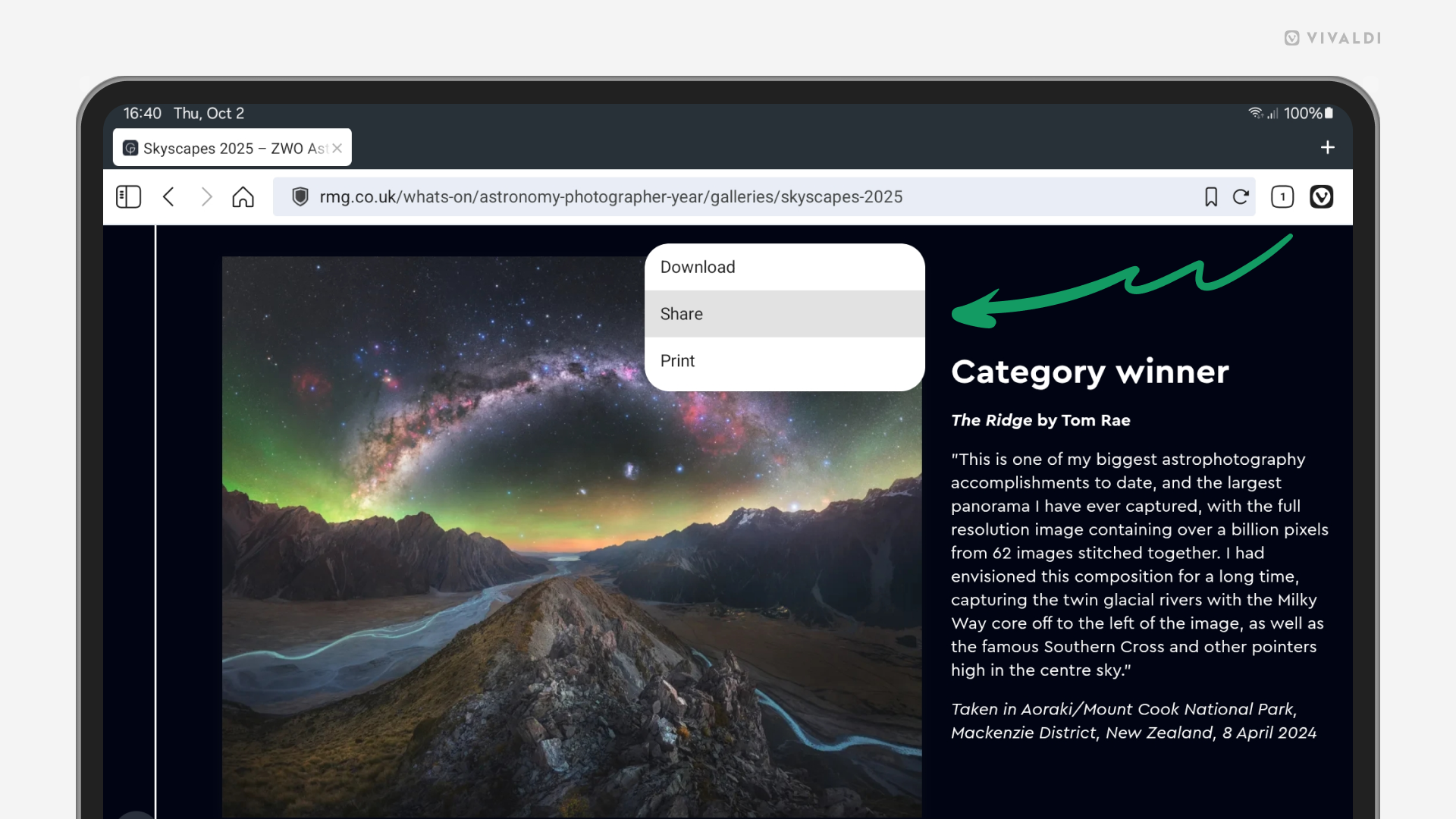
Tip #752
September 16, 2025
Give your synced devices distinct names.
It makes browsing with Vivaldi easier when each instance you sync has a clear name. For example, you’ll find tabs open on other devices faster, and sending a single tab to another device is quicker too. When you start syncing, you can give the synced Vivaldi instance a name during login, but you can also rename the device when Sync is already active.
To rename the device on desktop:
- Go to Settings > Sync.
- Click the pencil icon next to the current device name.
- Type in the new name and press “Enter”.
To rename the device on Android or iOS:
- Go to Settings > Sync.
- Tap “Edit” next to the current device name.
- Type in the new name.
- Tap “Confirm”.
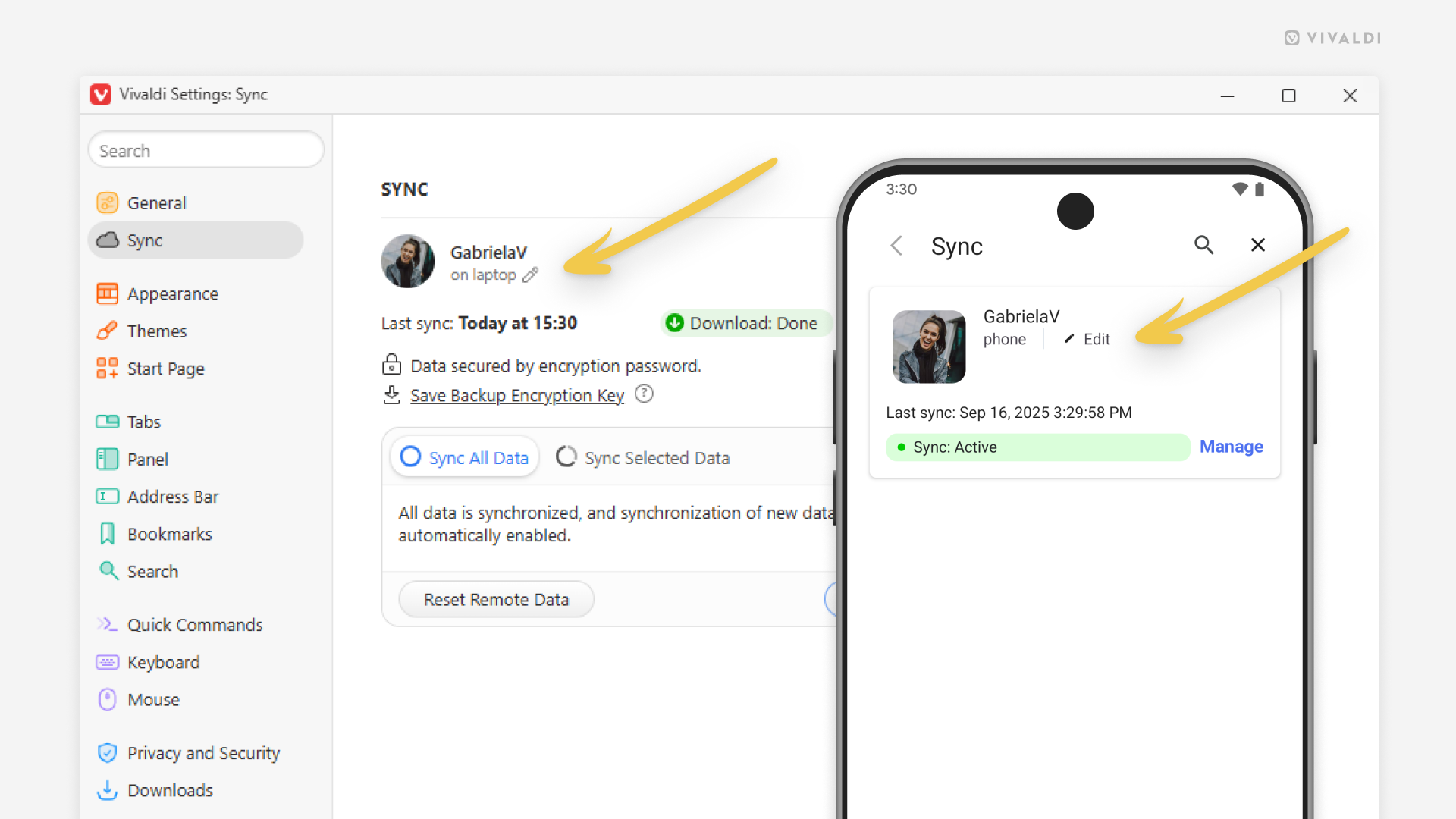
Tip #742
July 22, 2025
Go to bookmarked web pages on mobile from the search widget.
Opening the Vivaldi browser on Android or iOS and tapping on a Speed Dial is already a quick way to go to a bookmarked page, but what if you have a lot of Speed Dials or you haven’t added the bookmark to your Start Page? Then browsing through the bookmarks to find the right one can take longer.
When you give your bookmarks nicknames, on the other hand, you can open them quickly by typing the nickname in the search field. And why not do that directly from the Search Widget without opening the browser first?
To add the Search Widget on mobile check out the instrcutions for Android here and for iOS here.
To give a bookmark a nickname:
- Open the Bookmarks Panel.
- Find the bookmark you want to give a nickname to.
- Long-press on it and select “Edit” (pencil icon on Android).
- Give the bookmark a short nickname.
- Tap “Done”.
To open a bookmarked website from the widget.
- Tap on the Search Widget on the home screen.
- Type the nickname.
- Tap “Go”.
Tip #738
July 10, 2025
Exit Settings on mobile with a simple tap.
Vivaldi is known for its abundance of settings that allow you to customize the browser to fit your workflow and aesthetic preferences. To make navigating Settings easier, they’ve been divided into folders, meaning you might end up a couple of levels deep when toggling a setting. But instead of making your way back to the start step by step using the back button, you can simply tap the “X” (Android) or “Done” (iOS) button in the top right corner to get back to browsing.
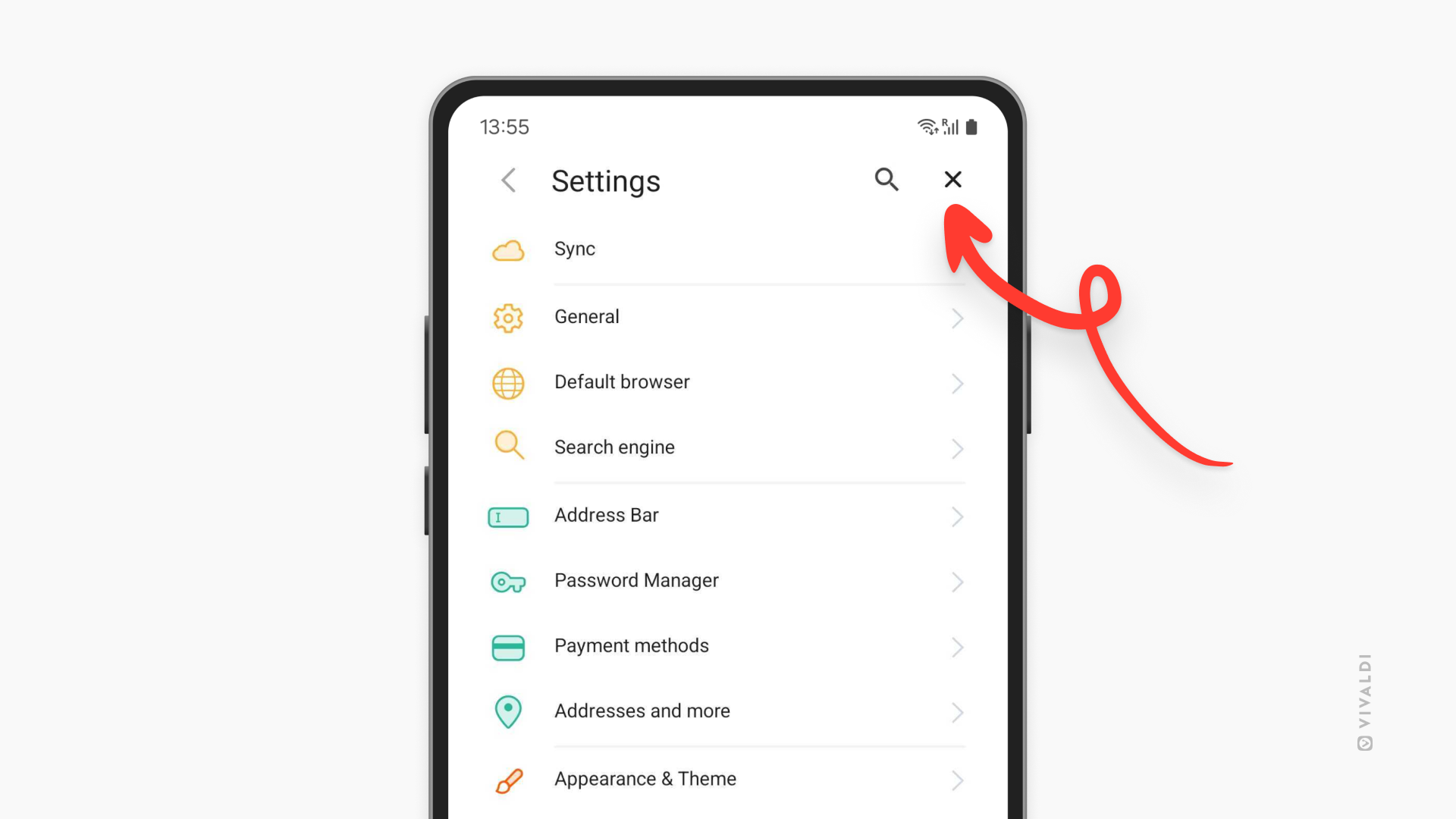
Tip #734
July 1, 2025
Open web pages from Android apps’ embedded browsers in the main Vivaldi browser window.
Some mobile apps include embedded browsers aka in-app browsers that allow viewing web content without moving from the app to the browser. But there’s a way to open these links in your default browser as well. Viewing the page in Vivaldi allows you to use the browser’s features that are not available in the embedded browser, such as bookmarking the page, changing the zoom level, switching to reader mode, etc.
To open links in Vivaldi:
- When you have the link open in the embedded browser, open the 3-dot menu in the top right corner.
- Select “Open in Vivaldi”.
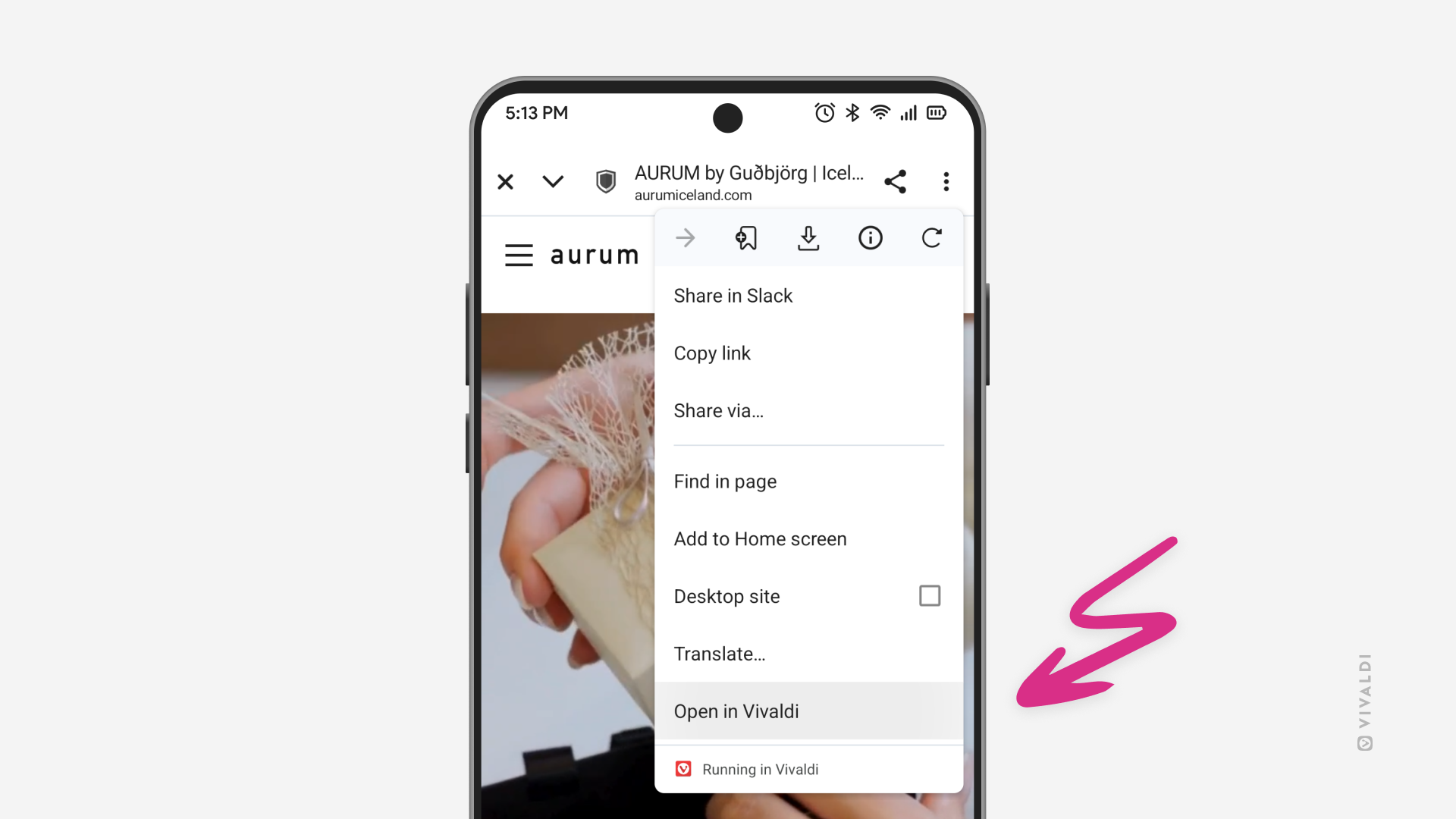
Tip #728
June 19, 2025
Mute websites in Vivaldi on Android.
If there’s a website that annoys you by playing media with audio, either automatically or it’s easy to accidentally hit play, you have every right to mute the website. Here are two ways to do it in Vivaldi on Android.
Option 1
- While a video or sound clip is playing on the web page, tap the shield icon on the Address Bar.
- Select Permissions.
- Toggle off “Sound”.
Option 2
- Go to Settings > Content Settings > Site Settings > Content > Sound.
- Tap on “Add site exception”.
- Enter the page’s URL.
- Tap on “Add”.
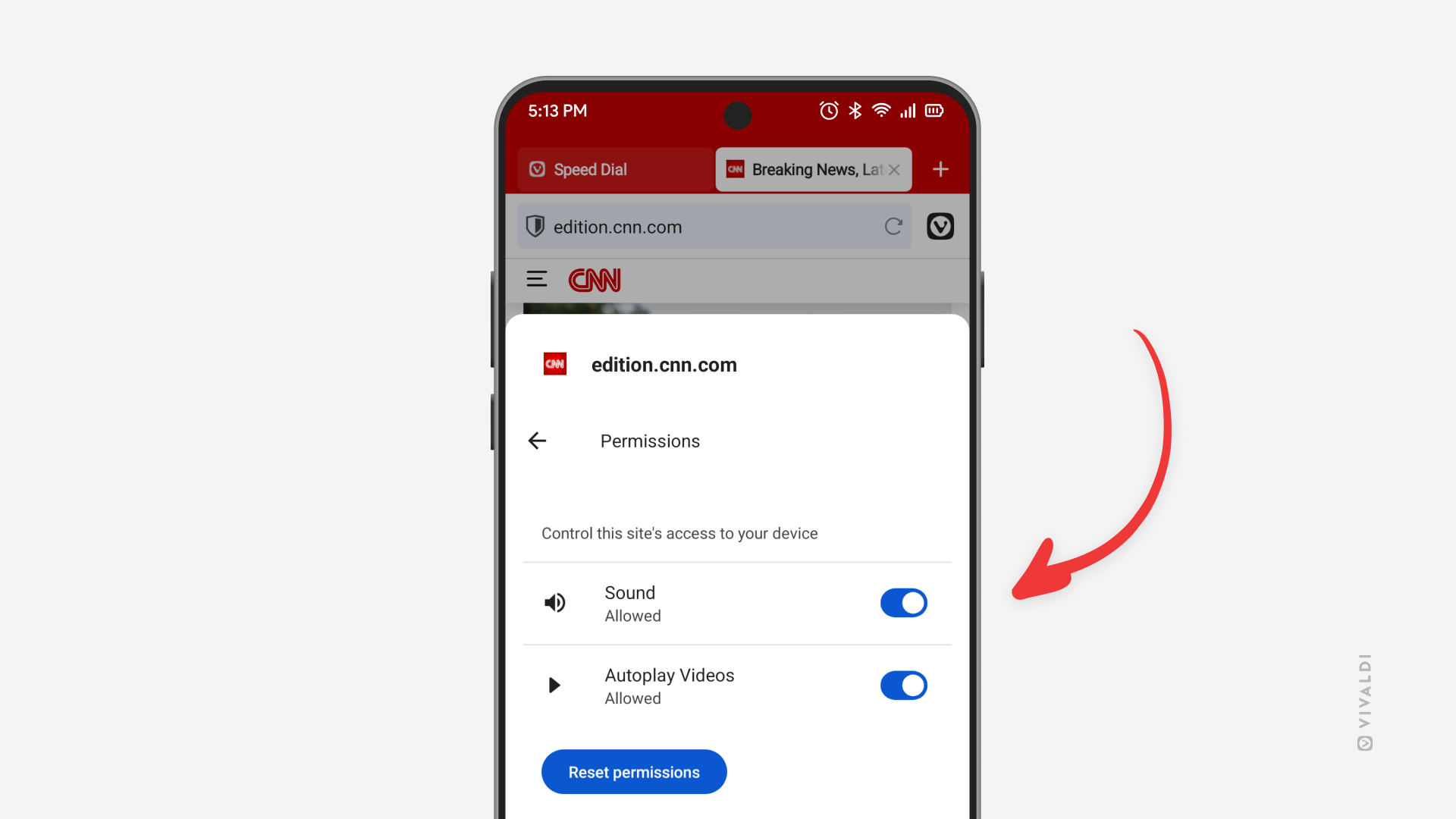
Tip #722
June 9, 2025
Hide past searches in the Address Field drop-down menu on mobile.
You can keep things more private and clean by excluding your past searches from the Address Field drop-down menu suggestions in Vivaldi on Android and iOS.
- Go to Settings > Address Bar > Address Field Suggestions.
- Disable “Search History”.
